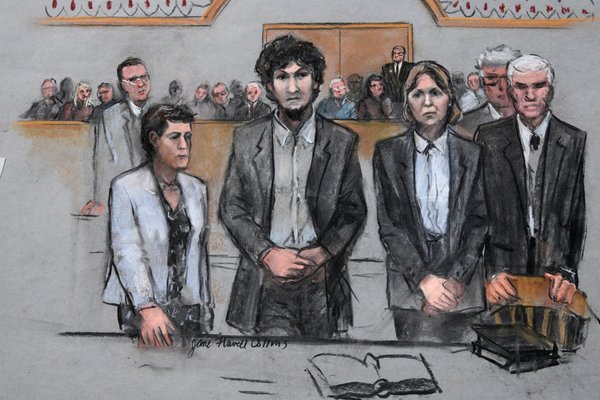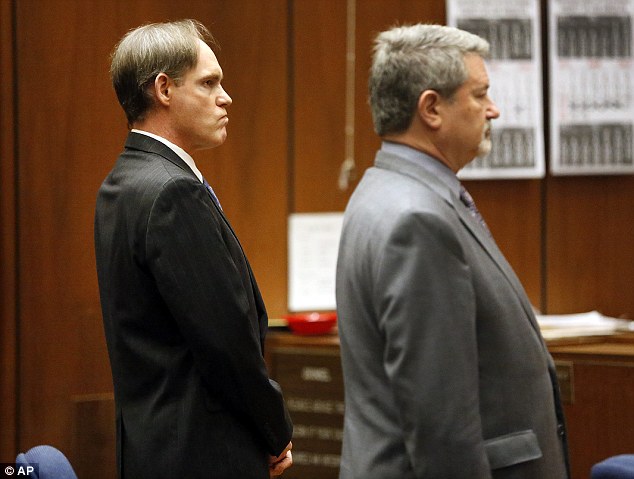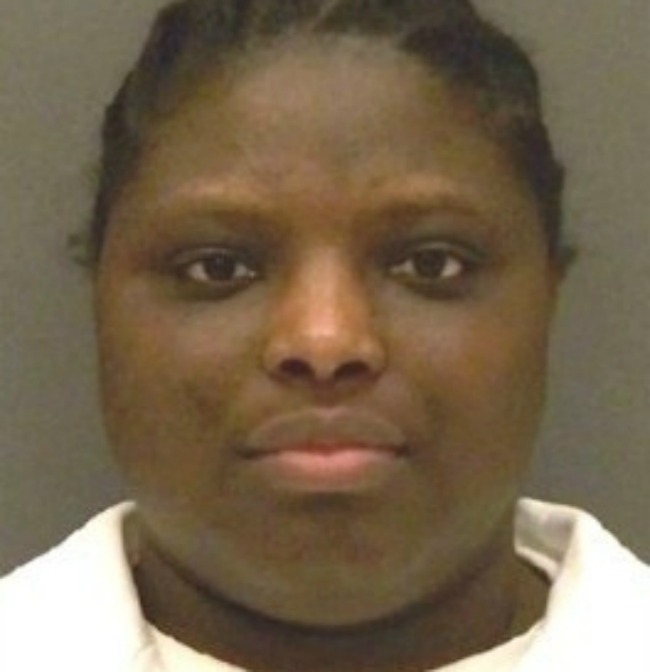In a sweeping rejection of the defense case, a federal jury on Friday condemned Dzhokhar Tsarnaev to death for his role in the 2013 Boston Marathon bombings.
The jury found that death was the appropriate punishment for six of 17 capital counts — all six related to Mr. Tsarnaev’s planting of a pressure-cooker bomb, which his lawyers never disputed. Mr. Tsarnaev sat stone-faced as the verdict was read.
At the same time, the jury rejected the centerpiece of the defense argument, that he was under the influence of his older brother, Tamerlan, a self-radicalized jihadist. Nor did it believe that being locked away in the supermax prison in Colorado would sufficiently restrict Mr. Tsarnaev’s communications with the outside world.
Only two of the 12 jurors said on the verdict form that they believed he had expressed sorrow and remorse for his actions, a stinging rebuke to Sister Helen Prejean, a Roman Catholic nun who had testified for the defense that Mr. Tsarnaev was “genuinely sorry” for what he had done.
The bombings transformed the marathon, a cherished rite of spring, from a sunny holiday on Boylston Street to a smoky battlefield scene, with shrapnel flying, bodies dismembered and blood saturating the sidewalks; three people were killed, while 17 people lost at least one leg. More than 240 others sustained serious injuries, some of them life-altering.
The packed courtroom was silent throughout the proceedings — warned before the judge and jury entered that any outburst would amount to contempt of court.
When the jury returned at 3:10, the forewoman passed an envelope to the judge. Jurors remained standing while the clerk read aloud the 24-page verdict form that they had filled out. It took him 20 minutes.
It was not clear until the end that the sentence was death, though all signs along the way pointed in that direction.
The jury took 14 hours to reach its sentence, which some legal specialists said was relatively quick in a case this complex.
Eric M. Freedman, a death penalty specialist at Hofstra University Law School, said that the relative speed of the verdict suggested two possible grounds for an all-but-certain appeal: “the failure to grant a change of venue, despite the overwhelming evidence the defense presented about community attitudes in Boston, and the failure to instruct the jury that if a single juror refused to vote for death, the result would be a life sentence.”
“Unfortunately for all concerned,” Mr. Freedman said, “this is only the first step on a long road.”
But other lawyers said that 14 hours was not speedy at all in a case like this, in which so much of the evidence weighed against the defendant, and they saw no serious grounds for appeal.
“I’ve seen juries return verdicts in 25 minutes if the evidence is strong,” said Michael Kendall, a former federal prosecutor in Boston. “But rarely do you have a case like this — a crime of such enormity to start with, plus a mountain of evidence and a defendant who is so unsympathetic.”
He said he thought that Mr. Tsarnaev’s callousness had struck the jury. “After he blows up this child on purpose, he’s out at the convenience store buying milk, then he smokes a little dope and plans on blowing up New York,” Mr. Kendall said.
Mr. Tsarnaev stood, his hands folded in front of him, as the jurors made their way out of the courtroom. Moments earlier, the judge, George A. O’Toole Jr. of Federal District Court, thanked them and sent them on their way: “So jurors, that’s it. You are now discharged.”
It was the first time a federal jury had sentenced a terrorist to death in the post-Sept. 11 era, according to Kevin McNally, director of the Federal Death Penalty Resource Counsel Project, which coordinates the defense in capital punishment cases.
Attorney General Loretta E. Lynch called the death sentence a “fitting punishment.”
The bombing was not a religious crime, said Carmen M. Ortiz, the United States attorney for Massachusetts, but “a political crime designed to intimidate and coerce the United States.”
In Russia, when contacted by a reporter and informed of the verdict, Mr. Tsarnaev’s father, Anzor, simply exhaled and hung up. He then turned off his cellphone.
Kheda Saratova, a human-rights activist in Chechnya who had acted as an adviser to Mr. Tsarnaev’s parents in the weeks after the bombing, said by phone that she talked to the family less than a month ago. “They’ve all been very distressed, especially Anzor,” she said. “Anzor kept saying, “Everything happens by the will of Allah.”
Among those in the courtroom were Bill and Denise Richard, whose 8-year-old son, Martin, had been killed in the attack and whose daughter, Jane, then 7, lost a leg. Despite their losses, the Richard family had called for Mr. Tsarnaev to receive life in prison. They said they feared that appeals would drag out a death sentence for years, making it hard for them to move forward with their lives.
Source: NY Times
















































































































































































































































![[Video] Chicago Police Officers Caught On Video Telling Two Black Men "We Kill Mother F**kers"](https://earhustle411.com/wp-content/uploads/2018/07/evil-cop-3-300x180.jpg)
![[Video] Chicago Police Officers Caught On Video Telling Two Black Men "We Kill Mother F**kers"](https://earhustle411.com/wp-content/uploads/2018/07/evil-cop-3-80x80.jpg)












![[Video] White Woman Calls The Cops On Black Real Estate Investor, Cops Threaten To Arrest Her For Harassing Him](https://earhustle411.com/wp-content/uploads/2018/05/nosy-neighbor-300x180.png)
![[Video] White Woman Calls The Cops On Black Real Estate Investor, Cops Threaten To Arrest Her For Harassing Him](https://earhustle411.com/wp-content/uploads/2018/05/nosy-neighbor-80x80.png)


![White Scientist Says The Black Community Is Being Targeted By The Medical System, They Are Deliberatly Being Poisoned [Video]](https://earhustle411.com/wp-content/uploads/2016/05/mike-adams-300x180.jpg)
![White Scientist Says The Black Community Is Being Targeted By The Medical System, They Are Deliberatly Being Poisoned [Video]](https://earhustle411.com/wp-content/uploads/2016/05/mike-adams-80x80.jpg)








![Teenage Girl Shot In Her Stomach Three Times But Took Time To Post To Facebook [ Video]](https://earhustle411.com/wp-content/uploads/2016/02/Gangster-chick-300x180.jpg)
![Teenage Girl Shot In Her Stomach Three Times But Took Time To Post To Facebook [ Video]](https://earhustle411.com/wp-content/uploads/2016/02/Gangster-chick-80x80.jpg)







